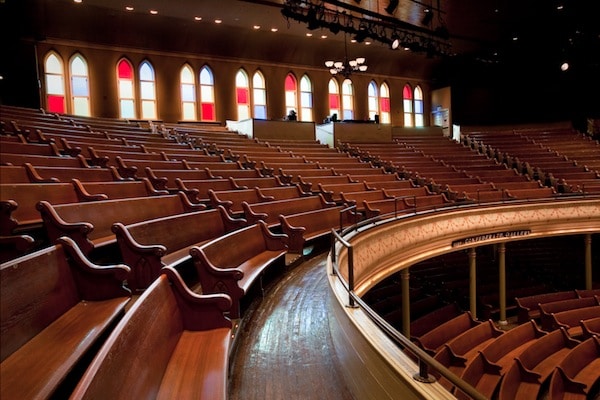
Videos by American Songwriter
CRAFTING THE COUNTRY HYMNAL
Roy Acuff was tired of being cheated. Hailing from Maynardville in the mountains of East Tennessee, he was arguably the biggest star on the Grand Ole Opry since 1938, a man whose voice was broadcast on a 50,000-watt clearchannel frequency that reached west to the Rockies, north to Canada, and south into the Gulf of Mexico. He had penned hits like “The Great Speckled Bird” and “The Precious Jewel” (both in 1940), often adapting tunes from traditional sources and making a small fortune selling songbooks. Still, he had seen the copyrights for a few of his compositions stolen by executives at American Record Corporation. Remarkably, this was an everyday business tactic throughout the music industry, targeted not only at Acuff but at any songwriter who might pen a hit. To end this predatory practice – at least in regard to his own songs – Acuff refused to record additional sessions until the label assured him he would have ownership of his own material.
With $25,000 – a small fortune at the time – Acuff bankrolled a song publishing company, partnering with local composer Fred Rose. Rose had worked first in New York, then in Hollywood penning ditties for Gene Autry movies, before moving to Nashville to ply his trade in the country music industry. Acuff-Rose incorporated in 1942, just months before the Opry moved into the Ryman. It was not the first music publishing company in Nashville, but it was the first one devoted to country music. “Acuff-Rose set the example for everybody who followed,” says John Rumble, senior historian at the Country Music Hall of Fame and Museum. “It was certainly a major factor in establishing Nashville as a music center.”
Glad-handing backstage at the Ryman, Acuff signed many of his Grand Ole Opry peers, including Red Foley, Little Jimmy Dickens, and Rose’s lanky protégé Hank Williams. It was a boon for local songwriters. Perhaps because both men were composers and industry veterans, they not only understood the obstacles other artists faced, but made it their mission to protect and market their clients. They employed a small army of promoters who, according to Rumble, “would take professional copies of songs to all the different radio performers in town. If someone couldn’t read music, then Fred Rose himself would make acetates.” What established the company’s local reputation – and what allowed Acuff-Rose to succeed over so many years – was the respect it accorded songwriters, elevating them to new heights in the industry. “They actually paid their writers. A lot of companies didn’t. But if Acuff-Rose made money, you made money.”
Until the company shuttered and its catalog was sold off in the mid 1980s (it’s now owned by Sony/ATV Music Publishing), Acuff-Rose published and promoted songs by some of the greatest writers ever to settle in Nashville: The Louvin Brothers, Felice and Boudleaux Bryant, Mickey Newbury, John D. Loudermilk, The Everly Brothers, Dallas Frazier, and too many others to list. Its catalog is arguably the foundation of country music, a collection unsurpassed by any of the companies that sprang up in its wake. If the Ryman is the mother church of country music, the Acuff-Rose catalog is the hymnal in its pews.
The rise of Acuff-Rose coincided not only with the Grand Ole Opry’s first decade at the Ryman, but also with the rise of the solo star replacing the large string bands that had dominated in the Opry’s early years. “Acuff was a key transitional figure in country’s evolution away from string bands, whose members were, more or less, equal and sometimes took turns at being the lead singer or lead instrumentalist,” says Rumble. Acuff – and, later, Hank Williams, Don Gibson, and other writer-performers – would challenge that system. “The format that still prevails today is a star singer backed by a band.”
Adds Colladay: “A lot of the earlier string bands drew from a folk repertoire and collected songs that other people had written. As Nashville was transitioning from bands to solo artists, there was also more and more focus on original songwriting.”
The success of Acuff-Rose not only changed country music, but boosted the Nashville economy. “Naturally,” says Rumble, “other artists and producers wanted to record here, too. If you had hits coming out of a cement building with dirt floors in the middle of nowhere, that’s where they’d go. So labels started establishing offices here, one of the first being Decca in 1947. By the early 1960s, you had everything you needed. You had studios. You had engineers and studio musicians. You had booking agents and song publishers and record-pressing plants. Success bred success.”

One Comment
Leave a Reply